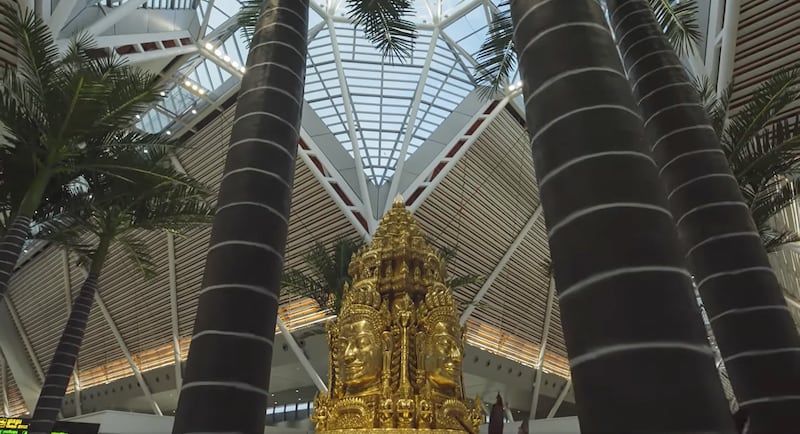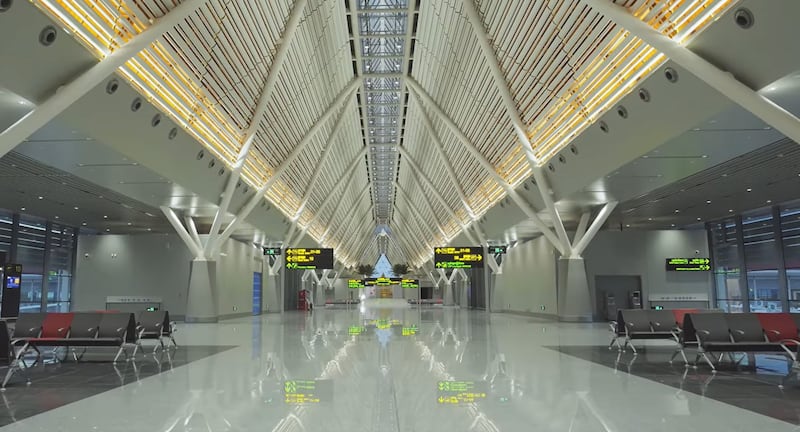Cambodian officials on Monday unveiled a US$1.1 billion airport near the famed Angkor temples – built by Chinese state-owned companies as part of the Belt and Road Initiative –even as tourist numbers continue to drop.
The first commercial flight into the new Siem Reap Angkor International Airport landed from Thailand as Deputy Prime Minister Vongsey Visoth praised China at a ceremony Monday.
This is “an historical achievement which shows the fruitful will in ironclad cooperation between China and Cambodia,” he said.
The airport is designed to be a cargo hub and transportation hub, with direct international flights, and a potential capacity of 7 million passengers a year, the Khmer Times reported.
It’s located 55 km (34 miles) southeast of Siem Reap town and the nearby Angkor temple complex, whereas the previous, much smaller airport was only about 8 km (5 miles) outside Siem Reap’s center.

Tourism has been a main pillar of the Cambodian economy, but the number of visitors to the 12th century temples has fallen since the COVID-19 pandemic.
There are currently between 1,000 to 1,500 visitors per day, Ministry of Tourism spokesman Top Sopheak told Radio Free Asia. Before the pandemic, there were between 8,000 to 9,000 visitors each day, he said.
The new airport could help revive those numbers, he said.
“The Ministry of Tourism has not been silent; it has made great efforts,” Top Sopheak said.
Tourism bookings remain low
But there continues to be evidence of a general decline in the economy in the province’s rural areas and in Siem Reap town, which is home to numerous luxury hotels and smaller guesthouses, all catering to tourists.
Some supermarkets and hotels have closed down since 2020, putting thousands of people out of work, according to tourism operator Ang Charles. And almost every street in Siem Reap town has “for sale” signs affixed to homes, cars or plots of land, he said.

During the recent Pchum Ben festival, there was a noticeable lack of spending, and bookings for other upcoming holidays are way down, he said.
“There are not many people on the streets,” he told RFA.
Meanwhile, Prime Minister Hun Manet flew from Phnom Penh to Beijing on Monday to attend The Third Belt and Road Forum for International Cooperation, which will include world leaders and representatives from 90 countries.
The conference will discuss the initiative, which began a decade ago as a way for Beijing to boost trade ties, secure energy supplies and invest in global infrastructure around the world.
But China has also been accused of “debt diplomacy” – trapping nations with financial liabilities for major infrastructure projects they can ill-afford.

In Siem Reap, the Chinese state-owned Yunnan Investment Group has been given the rights to the new airport for 55 years and is also spending $95 million on a 24 km (15 miles) expressway project that will connect the airport to the rest of the country.
A larger surrounding area has been set aside as a special economic zone, Cambodian officials said.
Other BRI projects in Cambodia include the Lower Sesan 2 Dam in Stung Treng province, the construction of the new Phnom Penh International Airport in Kandal province, the Phnom Penh-Sihanoukville Expressway and the Moradok Techo Stadium in Phnom Penh.
An official inauguration ceremony for the new Siem Reap airport is planned for next month, with Hun Manet in attendance.
Translated by Sok Ry Sum. Edited by Matt Reed and Malcolm Foster.
